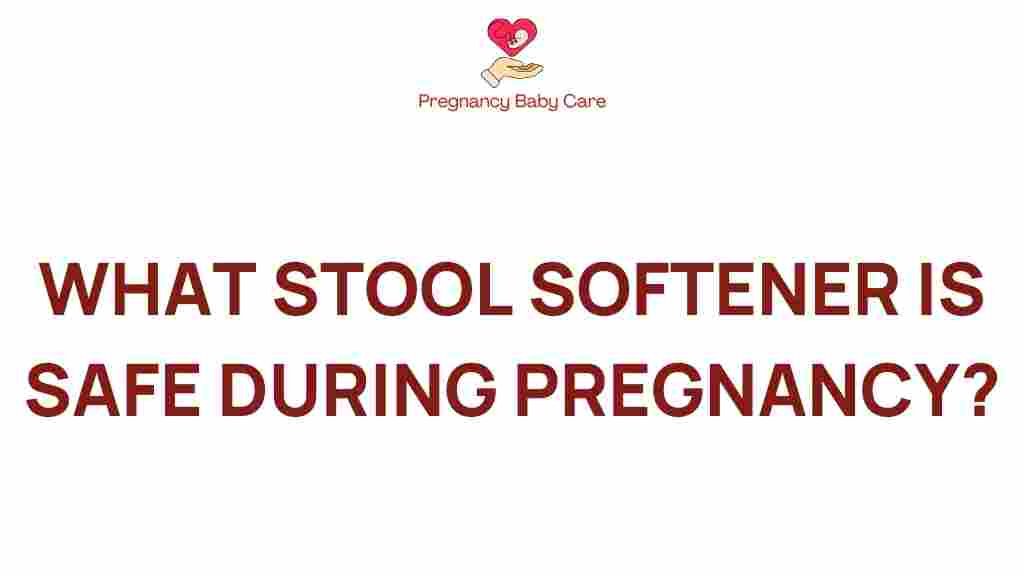Navigating Safe Stool Softeners: What’s Best for Expecting Mothers?
During pregnancy, expectant mothers often face various challenges, one of which is constipation. Changes in hormones, pressure from the growing uterus, and dietary changes can lead to digestive discomfort. Fortunately, stool softeners can provide relief. However, it’s essential to understand what’s safe for maternal health and when to use these medications. This guide will help you navigate the world of stool softeners, focusing on safe medications for pregnancy, constipation relief, and overall digestive wellness.
Understanding Constipation During Pregnancy
Constipation is a common complaint during pregnancy, affecting approximately 50% of pregnant women at some point. It can be attributed to:
- Hormonal Changes: Increased progesterone levels can relax the muscles in the gastrointestinal tract, slowing down digestion.
- Dietary Changes: Many women change their diets during pregnancy, which may lead to lower fiber intake.
- Physical Changes: The growing uterus puts pressure on the intestines, impacting bowel movements.
Recognizing the symptoms of constipation is crucial. Common signs include:
- Infrequent bowel movements (less than three times per week)
- Hard or lumpy stools
- Pain or discomfort during bowel movements
- A feeling of incomplete evacuation
Safe Medications: What to Look For in a Stool Softener
When considering a stool softener during pregnancy, it’s important to choose options that are safe for both the mother and the developing baby. Here are some guidelines:
- Consult Healthcare Providers: Always consult your healthcare provider before taking any medication, including stool softeners.
- Choose the Right Type: Stool softeners like docusate sodium are generally considered safe during pregnancy.
- Avoid Certain Laxatives: Some laxatives, such as those containing senna or bisacodyl, may not be recommended for expectant mothers.
Popular Stool Softeners Safe for Pregnancy
Here are some stool softeners that are commonly recommended for pregnant women:
- Docusate Sodium: Often sold under brand names like Colace, this stool softener works by drawing water into the stool, making it easier to pass.
- Polyethylene Glycol (PEG): Also known as MiraLAX, PEG is an osmotic laxative that helps to hydrate the stool and is generally considered safe for short-term use.
Step-by-Step Process for Using Stool Softeners
Here’s a simple guide for expectant mothers on how to use stool softeners effectively:
1. Consult Your Doctor
Before starting any stool softener, discuss your symptoms with your healthcare provider. They can recommend the best approach based on your individual health needs.
2. Choose the Right Product
Select a stool softener that is safe for pregnancy, such as docusate sodium. Read the label carefully to ensure there are no harmful ingredients.
3. Follow Dosage Instructions
Adhere strictly to the dosage recommended by your healthcare provider or as stated on the packaging. Do not exceed the recommended dose.
4. Increase Fluid Intake
Drinking plenty of water is crucial when using stool softeners. Aim for at least 8-10 glasses of water a day to help the medication work effectively.
5. Maintain a High-Fiber Diet
Incorporate fiber-rich foods into your diet, such as:
- Fruits (apples, pears, and berries)
- Vegetables (broccoli, carrots, and leafy greens)
- Whole grains (oats, brown rice, and whole wheat bread)
6. Monitor Your Symptoms
Keep track of your bowel movements and any changes in your symptoms. If constipation persists despite using a stool softener, consult your healthcare provider.
Additional Tips for Constipation Relief
Aside from stool softeners, there are several strategies expectant mothers can implement to alleviate constipation:
- Regular Exercise: Gentle exercises like walking or prenatal yoga can stimulate digestion.
- Probiotics: Consider incorporating probiotic-rich foods like yogurt or kefir, which can promote digestive wellness.
- Establish a Routine: Try to go to the bathroom at the same time each day to help train your body.
Troubleshooting Common Issues
While stool softeners can be effective, some expectant mothers may face challenges. Here are some common issues and solutions:
1. Ineffective Relief
If you find that your stool softener isn’t providing relief:
- Ensure you are drinking enough water.
- Consider dietary changes to increase fiber intake.
- Consult your healthcare provider for alternative options.
2. Side Effects
Some women may experience mild side effects from stool softeners, including:
- Stomach cramps
- Nausea
- Diarrhea
If side effects are severe or persistent, stop using the stool softener and consult your healthcare provider.
3. Overuse Concerns
Using stool softeners too frequently can lead to dependence. To avoid this:
- Combine stool softeners with lifestyle changes instead of relying solely on medication.
- Use stool softeners for short periods, as advised by your doctor.
Conclusion
Constipation during pregnancy can be uncomfortable, but safe stool softeners provide effective relief for expectant mothers. By understanding what medications are safe, following a structured approach, and implementing lifestyle changes, pregnant women can maintain their digestive wellness and overall maternal health. Always consult with your healthcare provider before starting any new medication during pregnancy to ensure the best outcomes for both you and your baby.
For more information on prenatal care and maintaining a healthy pregnancy, visit this resource.
For further reading on digestive health during pregnancy, check out this comprehensive guide.
This article is in the category Pregnancy and created by PregnancyBabyCare Team
